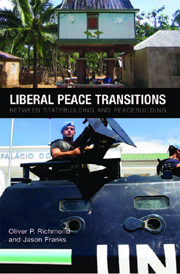Book contents
- Frontmatter
- Contents
- Acknowledgements
- List of Acronyms
- Introduction: a Framework to Assess Liberal Peace Transitions
- 1 Cambodia: Liberal Hubris and Virtual Peace
- 2 Bosnia: Between Partition and Pluralism
- 3 Liberal Peace in East Timor: the Emperors' New Clothes?
- 4 Co-opting the Liberal Peace: Untying the Gordian Knot in Kosovo
- 5 Building/Rejecting the Liberal Peace: State Consolidation and Liberal Failure in the Middle East
- Conclusion: Evaluating the Achievements of the Liberal Peace and Revitalising a Virtual Peace
- Select Bibliography
- Index
2 - Bosnia: Between Partition and Pluralism
Published online by Cambridge University Press: 12 September 2012
- Frontmatter
- Contents
- Acknowledgements
- List of Acronyms
- Introduction: a Framework to Assess Liberal Peace Transitions
- 1 Cambodia: Liberal Hubris and Virtual Peace
- 2 Bosnia: Between Partition and Pluralism
- 3 Liberal Peace in East Timor: the Emperors' New Clothes?
- 4 Co-opting the Liberal Peace: Untying the Gordian Knot in Kosovo
- 5 Building/Rejecting the Liberal Peace: State Consolidation and Liberal Failure in the Middle East
- Conclusion: Evaluating the Achievements of the Liberal Peace and Revitalising a Virtual Peace
- Select Bibliography
- Index
Summary
Introduction
Ten years after the Dayton Peace Accords effectively ended the war in Bosnia and Herzegovina (BiH), the prospects for a self-sustaining liberal democratic state in Bosnia seem still to face significant problems. The state remains ethnically and democratically polarised. Being subject to separatist political agendas, the government is constantly deadlocked and unable to move forward, ethnic and religious chauvinism are still relatively common, and development and marketisation have not produced a significant peace dividend for the people on the ground. Even civil society projects are marred by ‘forum shopping’ and a project mentality, while local politicians are dependent on the international community, whose members are forced to substitute for local stalemates even though they know that this undermines local capacity. This deadlock has in turn allowed Republika Srpska (RS) to move forward with its own separate – and probably separatist – agendas while Bosnia remains politically deadlocked.
Indeed, some local commentators go as far as to say that there still is not a state in existence, given that there is little official documentation in local languages on the state and that there has not been a local ratification process to make the current situation accountable to the Bosnian citizens. The view is commonly held that Dayton was a formula to end the war, for conflict management rather than creating a self-sustaining form of peace.
- Type
- Chapter
- Information
- Liberal Peace TransitionsBetween Statebuilding and Peacebuilding, pp. 54 - 82Publisher: Edinburgh University PressPrint publication year: 2009

